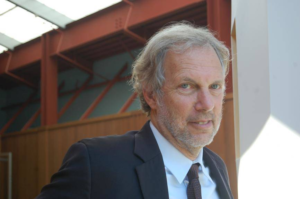Chomsky And Pollin: Protests Outside Of COP26 Offered More Hope Than the Summit
The legacy of the 2021 United Nations Climate Change Conference (COP26) this fall was perhaps best encapsulated by its president, who bowed his head and — close to tears — actually apologized for the process, which ended with a last-minute watering-down of participants’ pledges on coal.
“May I just say to all delegates I apologize for the way this process has unfolded and I am deeply sorry,” said Alok Sharma, the British politician who served as president for COP26. The conference ended on November 13 with a disheartening “compromise” deal on the climate after two weeks of negotiations with diplomats from more than 190 nations.
In the interview that follows, leading public intellectuals Noam Chomsky and Robert Pollin offer their assessments of what transpired at COP26 and share their views about ways to go forward with the fight against the climate crisis. Chomsky — one of the most cited scholars in history and long considered one of the U.S.’s voices of conscience — is Institute Professor Emeritus at the Massachusetts Institute of Technology and currently Laureate Professor of Linguistics and Agnese Nelms Haury Chair in the Agnese Nelms Haury Program in Environment and Social Justice at the University of Arizona. He is joined by one of the world’s leading economists of the left, Robert Pollin, who is Distinguished Professor and co-director of the Political Economy Research Institute at the University of Massachusetts at Amherst. Chomsky and Pollin are co-authors of the recently published book, Climate Crisis and the Global Green New Deal: The Political Economy to Save the Planet.
C.J. Polychroniou: COP26, touted as our “last best hope” to avert a climatic catastrophe, has produced an outcome that was a “compromise,” according to United Nations Secretary General António Guterres, while activists conducted a funeral ceremony at the Glasgow Necropolis to symbolize the failure of the summit. Noam, can you give us your analysis of the COP26 climate agreement?
Noam Chomsky: There were two events at Glasgow: within the stately halls, and in the streets. They may have not been quite at war, but the conflict was sharp. Within, the dominant voice mostly echoed the concerns of the largest contingent, corporate lobbyists; rather like the U.S. Congress, where the impact of lobbyists, always significant, has exploded since the 1970s as the corporate-run neoliberal assault against the general population gained force. The voice within had some nice words but little substance. In the streets, tens of thousands of protesters, mostly young, were desperately calling for real steps to save the world from looming catastrophe.
The outcome of this conflict will determine the course of history — or more precisely, will determine whether future human history will be “nasty, brutish and short” (to lift philosopher Thomas Hobbes’s words) or full of promise and opportunity.
The conflict is nicely encapsulated in a report of Brazil’s National Institute of Space Research. It is dated October 27, just a few days before COP26 opened, offering space for fine words and eloquent promises about saving the Amazon forests, a precious resource for Brazil’s future, and the world’s.
The Institute reported that “the area deforested in Brazil’s Amazon reached a 15-year high after a 22% jump from the prior year, [an outcome that] flies in the face of [the Jair] Bolsonaro government’s recent attempts to shore up its environmental credibility,” to put it politely.
It was put less politely by spokespersons for Brazilian and international environmental organizations. One said, “We are seeing the Amazon rainforest being destroyed by a government which made environmental destruction its public policy.” Another said: “This is the real Brazil that the Bolsonaro government tries to hide with fantastical speeches and actions of greenwashing abroad. The reality shows that the Bolsonaro government accelerated the path of Amazon destruction.”
Within the halls there were many “fantastical speeches,” while the outside world revealed much that “flies in their face.” Within, there was great enthusiasm about the $130 trillion that will be provided by financial institutions to rescue us. U.S. chief negotiator John Kerry was exultant that the market is now on our side.
He might be right, if we understand the phrase “the market” to refer not to the “fantastical” concept that is conjured up in public discourse but to the real world market: What Robert Pollin and Gerald Epstein call the neoliberal “bailout economy.”
How the holy market works in this case is outlined by political economist Adam Tooze. Lending by the holders of the rescue package of $130 trillion “will not be concessional,” he writes.
“The trillions, Kerry insisted to his Glasgow audience, will earn a proper rate of return. But how then will they flow to low-income countries? After all, if there was a decent chance of making profit by wiring west Africa for solar power, the trillions would already be at work. For that, Larry Fink of BlackRock, the world’s largest fund manager, has a ready answer. He can direct trillions towards the energy transition in low-income countries, if the International Monetary Fund and the World Bank are there to ‘derisk’ the lending, by absorbing the first loss on projects in Africa, Latin America and Asia. Even more money will flow if there is a carbon price that gives clean energy a competitive advantage.”
“It is a neat solution,” Tooze adds: “The same neat neoliberal solution that has been proffered repeatedly since the 1990s. The same solution that has not been delivered.” And won’t be delivered unless the friendly taxpayers (excluding the rich, who are granted ways to exempt themselves) perform their neoliberal duty in the “bailout economy.”
Others added their own interpretation of the lofty rhetoric within the halls. Not least Washington. “We must seize this moment,” President Joe Biden declared in Glasgow. On returning home, he “opened the largest oil and gas lease sale in U.S. history,” carrying out a program set in motion by former President Donald Trump.
In defense, the administration held that it was obligated to proceed because of “a preliminary injunction issued by a federal judge in June, saying that its proposed pause on new leases would be illegal.” Environmental groups point out a variety of options, but the main conclusions stare us in the face: The reigning institutions, whether federal or judicial, are unwilling to take the steps needed to save us from catastrophe.
Threats will mount when, as seems likely, the denialist party storms back into power, having successfully blocked government programs that would help the population but bolster their political opposition, along with a flood of lies about saving innocent little children from the “critical race theory” villains who are teaching them that they are by nature brutal oppressors, and whatever other hysteria they can whip up.
As Trump took over sole possession of the Republican Party, the percentage of Republicans who regarded global warming as a “serious problem” declined from 49 percent to 39 percent while, “The proportion of Democrats who see climate change as an existential threat rose by 11 points to 95 percent over seven years.” It’s not hard to imagine how the wrecker and his minions will gleefully exploit the renewed opportunity to race as quickly as possible toward irreversible tipping points, while enriching their corporate masters.
The “last, best hope” in Glasgow was not the conference of 120 world leaders, but the competing event that was taking place in the streets outside. They are the ones who can compel the powerful in government and corporate headquarters to act expeditiously to use the options available to avert the race to destruction and to create a better world.
Can we draw hope from the promise made by the countries meeting in Glasgow to “revisit and strengthen” new plans by the end of 2022, or should we interpret this pledge as another way on the part of world leaders to just keep kicking the can down the road?
Chomsky: There were a few positive developments within the halls in Glasgow, though far short of what is urgently needed. The question of how to interpret the pledge brings to mind Karl Marx’s 11th thesis on Ludwig Feuerbach: The task of those committed to decent survival is not to interpret the pledge but to act to ensure that it is more than pious verbiage.
Bob, first what’s your own assessment of the key outcomes from COP26, and what do you make of the position of those countries which were fiercely opposed to calls for the inclusion of fossil fuels in any final agreement and phasing out coal and fossil fuel subsidies?
Robert Pollin: The first thing to say about the COP26 conference is that it demonstrated, yet again, the breathtaking capacity of high-level diplomats to discuss issues of human survival almost entirely disconnected from reality. For example, it was considered an achievement of the conference that, for the first time, the burning of fossil fuels to produce energy was officially recognized as a cause of climate change. The only way that we can consider this progress is in relationship to the flat-out absurdity that the previous 25 COP agreements had all failed to acknowledge the long-established reality that burning fossil fuels is responsible for producing about 75-80 percent of the greenhouse gases causing climate change.
Beyond this measure of “progress,” the COP26 diplomats still wrangled over whether they objected, full stop, to governments providing fossil fuel subsidies or rather, whether they objected only to fossil fuel subsidies that are “inefficient,” whatever that means. Not surprisingly, the final document ended up only opposing “inefficient” subsidies. Similarly, at the very end of the meetings, China and India managed to substitute a reference to “phasing down” coal rather than the original text that referred to “phasing out” coal.
Amid such word-parsing exercises, the underlying reality is that, even with all the pledges made at the last major COP conference, COP21 in Paris in 2015, almost nothing has been accomplished in terms of reducing CO2 emissions. Thus, in its 2021 “World Energy Outlook,” the International Energy Agency (IEA) projects that, according to its “stated policies” scenario — i.e. a scenario that takes account of all government pledges made at Paris along with what they have actually accomplished relative to these pledges — global CO2 emissions will not fall at all as of 2030 and will fall by less than 6 percent as of 2050, from 36 billion tons of emissions today to 33.9 billion tons as of 2050. This, again, is within the context of the Paris agreements, in which all 196 countries committed to stabilizing the global average temperature at 1.5 degrees Celsius (1.5°C) above pre-industrial levels. To succeed in stabilizing the global average temperature at 1.5°C above pre-industrial levels, the Intergovernmental Panel on Climate Change has established that global CO2 emissions must fall by 45 percent by 2030 and reach zero emissions by 2050.
All of this tells us that we will never move on to a viable climate stabilization by relying on the words or pledges agreed to in any such diplomatic documents. The only way to move seriously onto a viable climate stabilization path is through grassroots political organizing that forces governments to take actions that they will otherwise never take. If there was any good news out of COP26, it is that political organizers were in the streets in Glasgow in full force and could not be ignored.
Their presence did force some concessions into the final document: About half of the nearly 200 country delegations agreed to cut methane emissions by 30 percent as of 2030. The full body pledged to end deforestation by 2030. The full body also acknowledged “with deep regret” that the rich countries that are responsible for the climate crisis have not fulfilled their financial pledges to support green transition programs in low-income countries. It remains an open question as to whether this “deep regret” will lead to serious financing commitments that will actually be met.
Why is the transition to clean energy so slow? Is it a question of lack of investments and technological know-how, or something else?
Pollin: By some metrics, the transition to clean energy is proceeding fairly quickly. For example, as of 1985, solar energy provided less than 0.01 percent of the world’s electricity supply. By 2020, that figure is up to 3.3 percent. This is an increase of nearly 3,000 percent in 35 years. Of course, we are starting in 1985 with a miniscule base of solar production. More importantly, the level of solar supply can’t remain stuck in the range of 3 percent of electricity in order to meet the climate goals. It rather needs to be in the range of 60-70 percent as of 2050.
A major factor that had prevented the expansion of clean renewable energy from expanding more rapidly had been cost. As recently as 2010, the average cost globally of producing a kilowatt of electricity through solar energy was 38 cents. As of 2020, the average cost had fallen to less than 7 cents. Meanwhile, the comparative average cost for fossil-fuel-generated electricity has remained stable over this decade at between 5-15 cents per kilowatt hour. In other words, solar is now fully cost-competitive with fossil fuels, which had not been true previously. Both onshore and offshore wind are also now fully cost-competitive with fossil fuels. As such, when we include energy efficiency investments along with those for renewable energy, the overall result is that this clean energy infrastructure can deliver both a zero emissions economy and lower energy costs.
Even with renewable energy costs dropping sharply, several critical issues still remain outstanding. One is the intermittency of solar and wind power supply — that is, the sun doesn’t shine at night and wind doesn’t blow all day everywhere. So transmission and storage questions do need to be addressed — for example, how to deliver wind-powered electricity reliably and at low cost from a farm in Western Pennsylvania to the center of Philadelphia? A lot of progress is being made toward resolving these issues. But also keep in mind that we don’t need to solve them completely right now, before we can proceed with the clean energy transition. We aren’t going to eliminate the use of fossil fuels next week, no matter what. We have roughly two decades to develop the transmission and storage technologies that we will need to operate the global economy on 100 percent renewable energy supply.
Another challenge with building the renewable energy infrastructure is land use. This is a serious question that has emerged in many places. Where do we site the wind turbines and arrays of solar panels without wrecking neighborhoods or natural environments? Part of the solution is to make as much use as possible of artificial surfaces — such as putting solar panels on rooftops or building solar canopies in parking lots. Such measures are becoming increasingly viable, with the costs of even residential solar installations now also reaching cost parity with both fossil fuels as well as utility-scale solar farms. A similar pattern is also occurring with offshore wind platforms.
Broadly speaking then, the technology, intermittency and land use issues are being addressed effectively despite inadequate levels of government support. Still, we need to find the funds to build this global clean energy infrastructure. That is going to require something like 2.5-3 percent of global GDP per year, i.e., about $2.5 trillion next year, then averaging about $4.5 trillion per year between now and 2050, according to figures in our book, Climate Crisis and the Global Green New Deal.
What was clear from COP26 is that government funding at sufficient levels will never be forthcoming without political struggles. This is despite the fact that the 2.5 percent of GDP that is required can be provided readily through some financing combinations that we have discussed previously. For example, converting all existing fossil fuel subsidies into clean energy subsidies, transferring only 5-10 percent of military spending into clean energy investments, or having the major central banks purchasing global green investment bonds. Such bond purchases could be in the range of 2 percent of the bailout injections that the Federal Reserve injected into Wall Street to prevent a financial collapse brought on by the COVID recession.
Democratic Rep. Alexandria Ocasio-Cortez said that people shouldn’t expect international climate summits like COP26 or governments to solve the climate crisis, but at the same time defended the Green New Deal plan. How do we realize the goals of the Green New Deal from below? This is a question addressed to both of you.
Chomsky: How was the New Deal realized, or any other step forward in human history? Virtually without exception by dedicated persistent activism. This time will not be different.
Elements are there. Thanks in no small part to Bob Pollin’s active engagement, backed by sound analytic work, unions are taking up the cause. That includes the United Mine Workers, proceeding well ahead of coal baron Sen. Joe Manchin, a congressional champion-in-receiving-funding-from-fossil-fuel-industries who is cooperating with rock-solid Republican opposition to steps to reverse the race to destruction.
There’s ample precedent for organized labor taking the lead, as it did in bringing the New Deal to fruition. One of the earliest environmental activists was Tony Mazzocchi of the Chemical and Atomic Workers International Union, workers who are the most immediate victims of poisoning the atmosphere. His efforts to form a Labor Party failed, and it’s not easy in the rigidly monopolized U.S. political system, but there are ways to progress even in this domain. There are encouraging signs that labor is reviving from the bitter 40-year neoliberal assault. The mass refusal to return to rotten and dangerous jobs is only one sign. The malaise that is leading to an unprecedented wave of “deaths of despair” in the white working class can, and must, be overcome and directed to the kind of militant labor action that 90 years ago created a base for social democracy in the U.S. while Europe was descending into fascist horror.
A third of Americans, overwhelmingly Republicans, don’t even regard global warming (let alone the much broader crisis of environmental destruction) as a “serious problem.” All must come to recognize, soon, that it is not only a serious problem but an urgent one, and that how we deal with it, right now, will determine the fate of human life as well as that of the countless species we are casually destroying. To achieve that essential goal requires major educational and organizational efforts, omitting no sector of the society, including those in thrall of Trump-style malevolence.
In Congress, Rep. Alexandria Ocasio-Cortez and Sen. Ed Markey have reintroduced a 2019 resolution calling for a comprehensive Green New Deal along the lines of the detailed work of Robert Pollin and his colleagues and, with somewhat different models from economist Jeffrey Sachs, now also backed by the IEA. Local and state-level initiatives are underway. There are major international actions, mostly by the young.
That’s the barest sample. There’s lots of work to do. This is not the time for musing on the sidelines.
Pollin: We need to be organizing at all levels of society to advance the global Green New Deal project. This means fighting to stop any and all communities and institutions from relying on burning fossil fuels to provide energy and to build a zero-emissions energy infrastructure through investments in both energy efficiency and clean renewables. Note that this is distinct from demanding that institutions divest their ownership shares of fossil fuel stock and bonds. The divestment movement has played a critical role in raising consciousness about the climate crisis. But its effectiveness is limited by the reality that if, say, a university sells its stocks in Exxon-Mobil, those stocks are getting purchased by hedge funds that are happy to buy the stocks at reduced prices. The hedge fund will then continue to earn dividends from their fossil fuel stocks as long as people continue to consume oil, coal and natural gas to meet their energy needs. So the Green New Deal program must start with the project of ending reliance on fossil fuels. And we certainly can’t wait for the next COP conference to settle the matter.
We then need to be clear that the case for the Green New Deal is overwhelming, at many levels: It is the way through which we can realistically get to zero emissions by 2050. The investments to build the clean energy infrastructure will be a major engine of new job opportunities, in all regions of the world. My co-workers and I have estimated that clean energy investments at about 2.5 percent of GDP per year would generate, for example, about 4-5 million jobs per year in the U.S. and about 20 million jobs in India. Creating these new jobs will also open opportunities to increase union organizing and raise the pay and benefits associated with these jobs. Building the clean energy infrastructure will also create new possibilities for small-scale public, private and cooperative ownership of renewable energy assets. It will eliminate the largest sources of outdoor air pollution, thus significantly raising public health standards. The Green New Deal must, critically, also be committed to just transition for the workers and communities that are currently dependent on the fossil fuel industry that will need to be phased out.
In combination, these various features of the global Green New Deal provide a powerful platform for committed and effective organizing. The diplomats that argued last week over what may constitute “inefficient” fossil fuel subsidies will then be forced into finally seeing the reality before their eyes.
Note: This transcript has been lightly edited.












